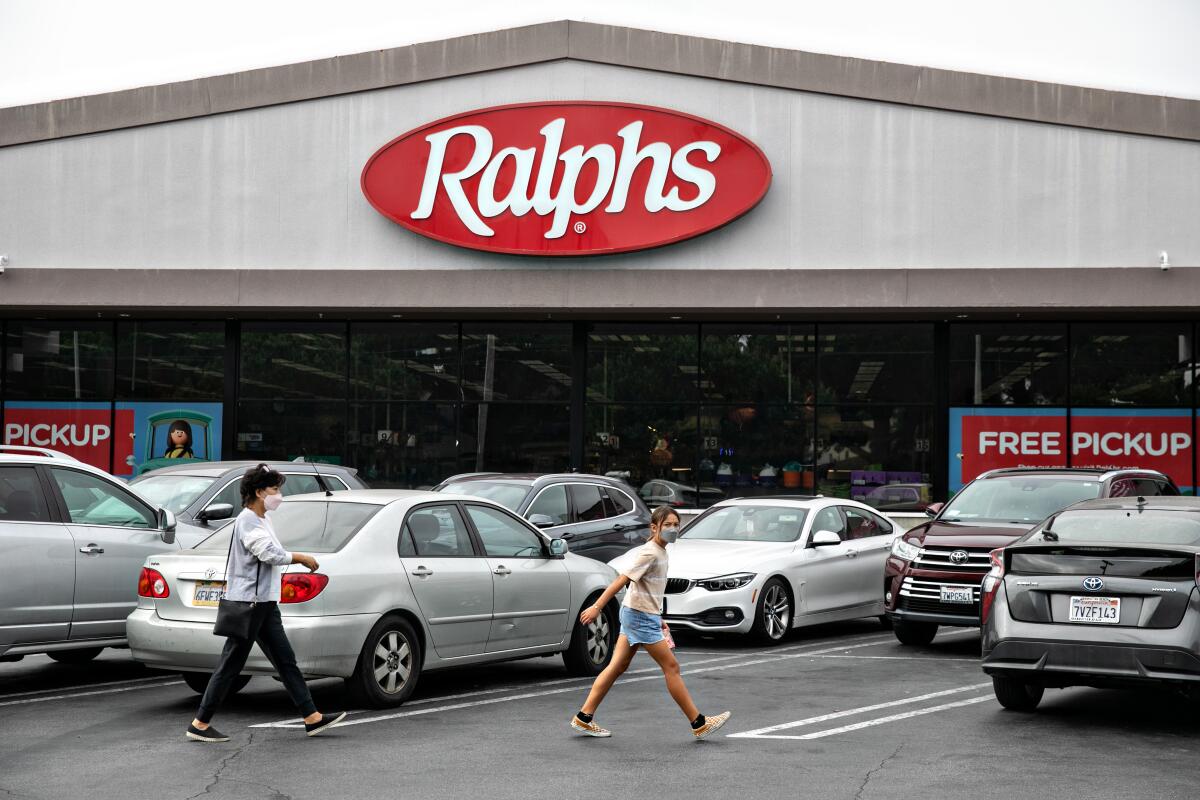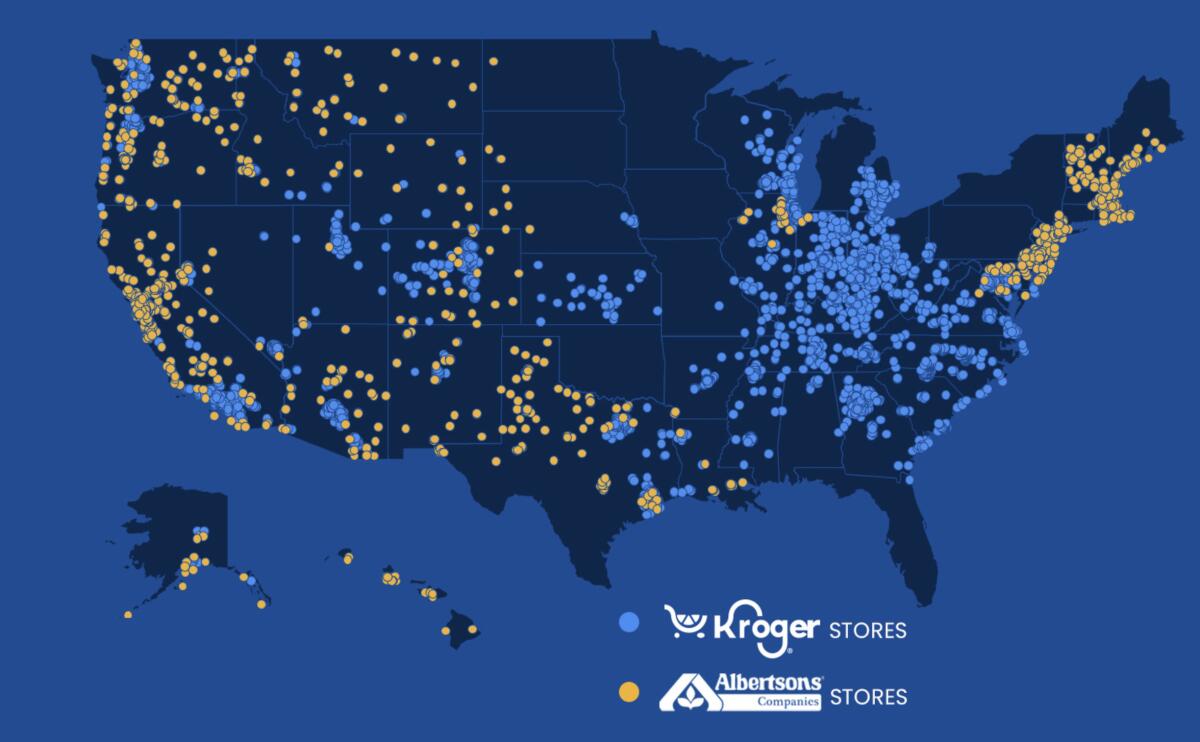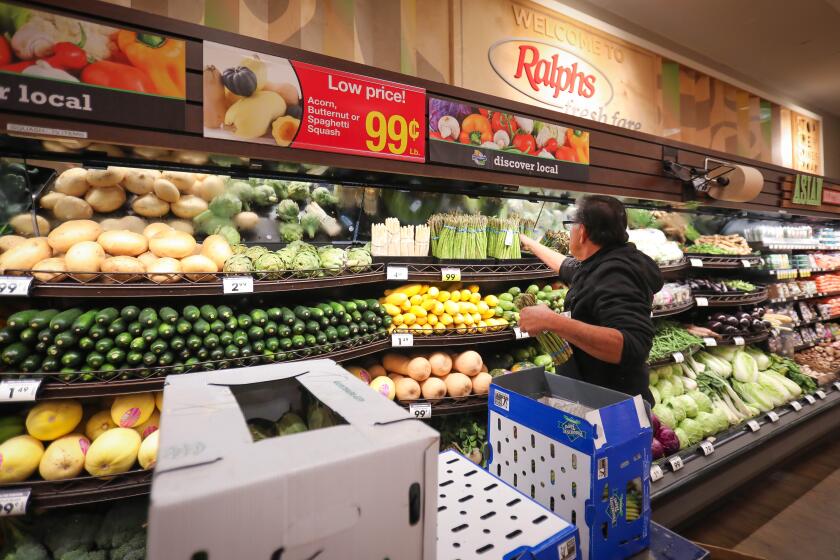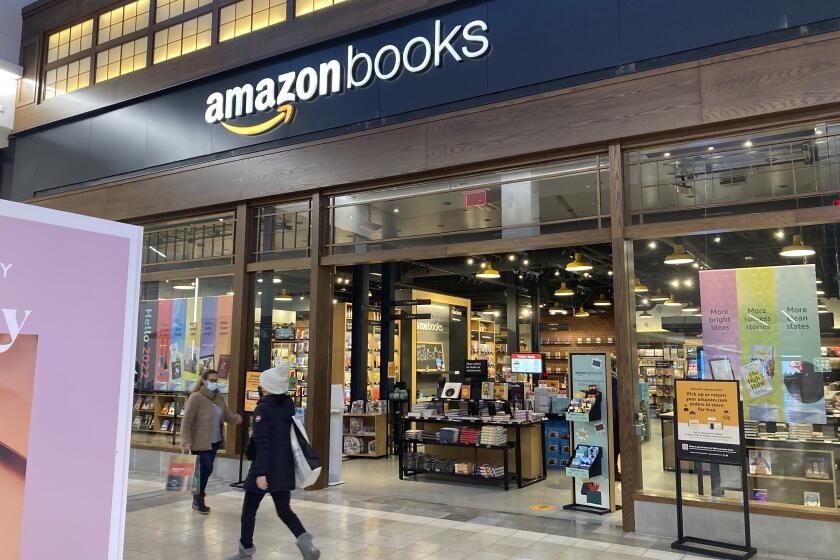Column: That big Albertsons-Kroger merger will enrich millionaire insiders at your expense

It should be obvious by now that the driving force of many corporate mergers, if not most or even all mergers, is the goal of enriching insiders. The pending merger of supermarket giants Albertsons and Kroger, however, injects that impulse with steroids.
At the heart of the $20-billion deal announced Oct. 14 is a $4-billion dividend that was scheduled to be paid Monday to Albertsons stockholders until it was temporarily blocked by a Washington state court.
Who are these stockholders? Six of them are corporate insiders, defined as holders of more than 5% of Albertsons shares each.
The special dividend...is part of Albertsons’ long-term strategy for growth
— Albertsons lawyer Ted Hassi
The big dog among them is the private equity firm Cerberus Capital Management, which owns nearly 30% of the shares and holds two seats on the company’s board of directors. The other five are investment and real estate funds that hold a total of an additional three board seats.
The six investors control about 75% of Albertsons shares. Combined with the three current and former Albertsons executives on the board, they hold a majority of seats. In other words, they voted themselves a multibillion-dollar handout.
Get the latest from Michael Hiltzik
Commentary on economics and more from a Pulitzer Prize winner.
You may occasionally receive promotional content from the Los Angeles Times.
A state judge in Washington issued a temporary restraining order late Thursday blocking Monday’s dividend payout, in response to a lawsuit by Washington state Atty. Gen. Bob Ferguson. The dividend also has been challenged in federal court by the attorneys general of California, Illinois and Washington, D.C.
The temporary restraining order issued by the Washington court after a hearing conducted via Zoom is subject to a further hearing scheduled for Nov. 10, according to Ferguson’s office. That hearing will cover whether the state court should issue a permanent injunction blocking the dividend.
As of this writing, Albertsons, which is based in Boise, Idaho, hasn’t filed an answer to the lawsuits in court. Late Thursday, the company said it would seek to overturn the Washington court order “as quickly as possible” and termed the lawsuits “meritless.”
Regardless of how the motions to block the dividend ultimately fare, the payout deserves special scrutiny for what it says about the structure of this deal and what its effect will be on Albertsons as the merger moves toward closing next year. The message is a dark one.
We’ve already reported on the likelihood that the Albertsons-Kroger merger will drive prices higher at the supermarkets’ cash registers.
Albertsons and Kroger say their merger would benefit consumers. The history of mergers, in the grocery business and elsewhere, offers cause for skepticism.
The deal will bring together the largest and second-largest supermarket companies. In California, Kroger owns Food4Less and Ralphs; Albertsons owns Safeway, Vons and Pavilions. The two companies control 38 other retail market brands nationwide.
The merger should be a prime target for antitrust officials at the Federal Trade Commission and Department of Justice.
Before we get further into the implications of the $4-billion payout, it’s proper to note that Albertsons apparently has been less than candid about how it came about. Way less than candid.
After receiving an Oct. 26 letter from the attorneys general of California, Illinois, Washington state, Idaho, Arizona and the District of Columbia asking Albertsons and Kroger to put the dividend on hold, Albertsons asserted that the payout had nothing to do with the merger.

In a letter responding to the request, an Albertsons lawyer, Ted Hassi of the firm Debevoise & Plimpton, said “the special dividend ... is part of Albertsons’ long-term strategy for growth,” which was “determined well before Albertsons’ discussions with Kroger began.”
Is that so? The companies’ own merger announcement stated explicitly that the $4-billion dividend is “part of the transaction.” It also counted the dividend as part of the merger price, accounting for $6.85 per share of the $34.10 per share payable to Albertsons shareholders.
According to the merger agreement, moreover, the special dividend was voted on by the Albertsons board at the same meeting at which they approved the merger deal itself.
Hassi, the Albertsons lawyer, told the states that the dividend will be paid whether or not the merger actually takes place. That points to the main issue raised by the plaintiffs in the lawsuits, which is that a $4-billion payout to shareholders will leave Albertsons as a floundering shell of itself in financial terms.
The dividend will sap Albertsons’ ability to function as an independent company, the plaintiffs assert. They have a point.
According to the company’s most recent financial disclosure, Albertsons had only $3.4 billion in cash on hand, among $9.3 billion in assets, most of which was tied up in inventory.
The company will have to borrow to raise funds for the special dividend, and that borrowing won’t come cheap — the company’s current outstanding debt is rated as junk grade by both Moody’s Investors Service and Standard & Poor’s.
Nor is the size of the dividend anything like normal for Albertsons. Its most recent quarterly dividend was 12 cents per share, to be paid to shareholders Nov. 14. The company paid out only $207.4 million in shareholder dividends in fiscal 2021, the company says, and spent nothing on share buybacks, the other way that corporations reward shareholders.
Amazon’s bid for One Medical raises troubling questions about health data privacy and marketing practices.
The special dividend, the states assert in court, would “reduce Albertsons’ ability to compete effectively with Kroger” if the merger doesn’t close, leaving it spavined as a rival if it remains independent — say because regulators have blocked the merger.
The orphaned Albertsons would have less money to spend on keeping its stores maintained, much less upgraded, and less to pay in wages and employee benefits.
The dividend, in other words, is a straitjacket.
It’s hard to avoid the impression that the $4-billion payout is a cynical money grab by Albertsons’ insiders, who will effectively be cashing out even if the merger fails to happen. Calling it part of a “long-term strategy for growth,” as Hassi did in his letter to the attorneys general, sounds like some sort of a joke.
It’s not especially easy for a company to invest in growth when it has deprived itself of $4 billion in capital and pumped up its debt merely to funnel loan proceeds to shareholders. Hassi acknowledged in his response to the attorneys general that the virtue of the $4-billion dividend is that it “provides near-term liquidity to all of its shareholders.”
In an annual report Hassi quoted, Albertsons said that its capital allocation strategy aimed to balance “investing for the future, strengthening our balance sheet and returns to shareholders.” Payouts to shareholders were separate and distinct from investing for the future. In other words, the $4 billion is a benefit to Cerberus and its fellow investment firms.
It hobbles, rather than empowers, Albertsons’ investing for the future. Whether the merger takes place or not, Albertsons customers are going to feel the consequences and they won’t be pretty.
More to Read
Get the latest from Michael Hiltzik
Commentary on economics and more from a Pulitzer Prize winner.
You may occasionally receive promotional content from the Los Angeles Times.










